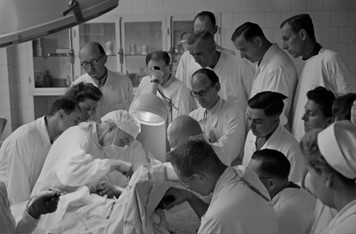In the early 1980s, then First Lady Nancy Reagan accompanied her husband on his presidential visit to South Korea. Prior to their trip, the White House received a letter pleading assistance for the many children needing heart surgery at a medical facility in Seoul. Moved, the First Lady answered their call.
Nancy Reagan decided to bring back two gravely ill children, orchestrating events that led to them receiving life saving open-heart surgery. In turn, she inspired philanthropist Salah Hassanein, and his friends Joseph Sinay and Morton Sunshine to launch Children’s Lifeline, an organization dedicated to giving children sustainable medical aid.
Children’s Lifeline: To Save and Train
Andrew Lodge reports that Children’s Lifeline initially focused on pediatric cardiac problems, but they have since expanded to other disciplines, including: cranio-facial, neurosurgery, and clinical problems such as waterborne diseases in the 40 years since its inception.
Throughout its operations, the organization has collaborated with Penn State Hershey Children’s Hospital, Rady Children’s Hospital in San Diego, University of California San Diego Medical Center, Boston Children’s Hospital, along with a multitude of well-known institutions in sharing medical expertise.
Around the United States, these teams coming from some of the best teaching hospitals and organizations volunteer their personal time to provide aid for the less fortunate all over the world. Since its inception, Children’s Lifeline has sponsored hundreds of trips to over 50 countries.
Aside from performing life saving surgery, the organization trains local doctors how to perform these procedures and guides nurses with post-op care, ensuring that the community continues to benefit long after the medical mission is over. There is a clear directive to save and train, providing countless numbers of children and their families hope for a healthy future.
Impacting Lives Through Medical Missions
Brett Halvorson–born Lee Kil Woo, one of the children Nancy Reagan has helped–talks about the impact of meeting her again in 2007. “Words can’t describe my feelings to see her again…If I were to put into words my feelings, it would be grateful and blessed,” said Halvorson in an interview with ABC News.
To pay forward the hope he received in his childhood, Halvorson is writing a book to raise awareness about the enormous need for children born with heart disease all around the world.

Recent and Upcoming Missions
In Children’s Lifeline’s recent 2023 medical mission to Africa, Dr. Robert Hamilton reports that their team served approximately 2,500 individuals in Senegal and Guinea Bissau. During their stay, they treated children with acute problems like pneumonia and acute diarrhea, and screened adults for hypertension and diabetes.
“Our hope is to help the people of the world who are overlooked; those in need…in the same way that Christ cared for the people he met during his time among us.” Hamilton said in a heartfelt remark. “That is our goal and I am pleased to report that this [is] what happened this year in Western Africa. Thank you to Children’s Lifeline International for participating in this effort.”
The organization also has medical missions lined up for Mexico, Kenya, and Ghana in the coming years.





